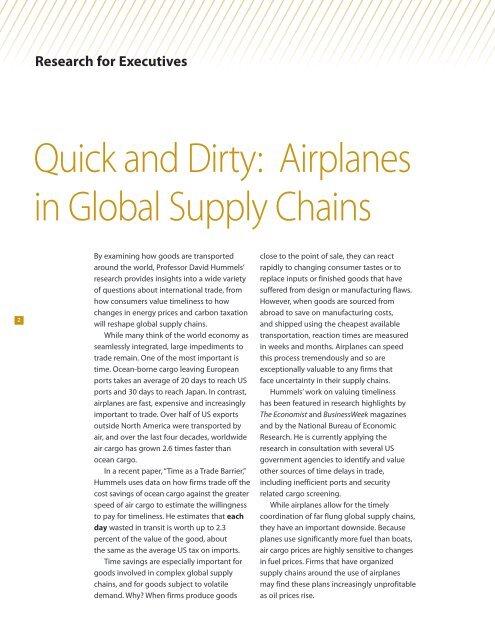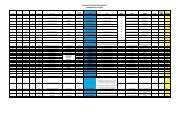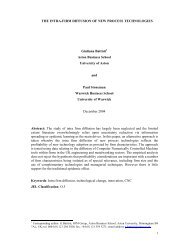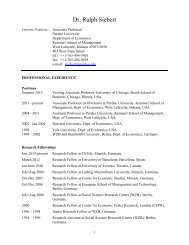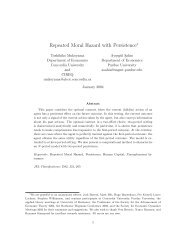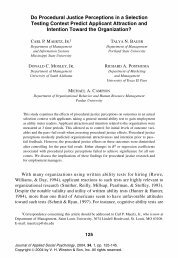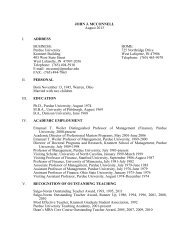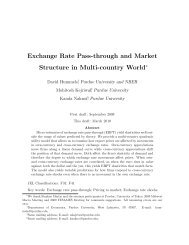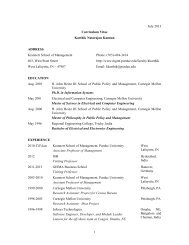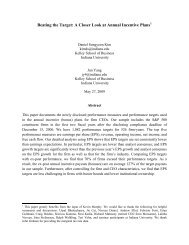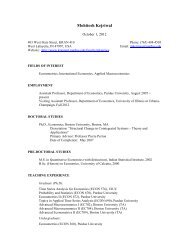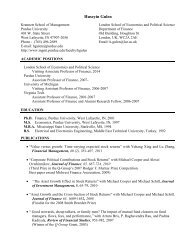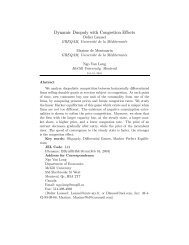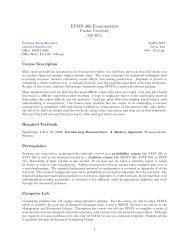October 2012 - Krannert School of Management - Purdue University
October 2012 - Krannert School of Management - Purdue University
October 2012 - Krannert School of Management - Purdue University
You also want an ePaper? Increase the reach of your titles
YUMPU automatically turns print PDFs into web optimized ePapers that Google loves.
Research for Executives<br />
Quick and Dirty: Airplanes<br />
in Global Supply Chains<br />
2<br />
By examining how goods are transported<br />
around the world, Pr<strong>of</strong>essor David Hummels’<br />
research provides insights into a wide variety<br />
<strong>of</strong> questions about international trade, from<br />
how consumers value timeliness to how<br />
changes in energy prices and carbon taxation<br />
will reshape global supply chains.<br />
While many think <strong>of</strong> the world economy as<br />
seamlessly integrated, large impediments to<br />
trade remain. One <strong>of</strong> the most important is<br />
time. Ocean-borne cargo leaving European<br />
ports takes an average <strong>of</strong> 20 days to reach US<br />
ports and 30 days to reach Japan. In contrast,<br />
airplanes are fast, expensive and increasingly<br />
important to trade. Over half <strong>of</strong> US exports<br />
outside North America were transported by<br />
air, and over the last four decades, worldwide<br />
air cargo has grown 2.6 times faster than<br />
ocean cargo.<br />
In a recent paper, “Time as a Trade Barrier,”<br />
Hummels uses data on how firms trade <strong>of</strong>f the<br />
cost savings <strong>of</strong> ocean cargo against the greater<br />
speed <strong>of</strong> air cargo to estimate the willingness<br />
to pay for timeliness. He estimates that each<br />
day wasted in transit is worth up to 2.3<br />
percent <strong>of</strong> the value <strong>of</strong> the good, about<br />
the same as the average US tax on imports.<br />
Time savings are especially important for<br />
goods involved in complex global supply<br />
chains, and for goods subject to volatile<br />
demand. Why? When firms produce goods<br />
close to the point <strong>of</strong> sale, they can react<br />
rapidly to changing consumer tastes or to<br />
replace inputs or finished goods that have<br />
suffered from design or manufacturing flaws.<br />
However, when goods are sourced from<br />
abroad to save on manufacturing costs,<br />
and shipped using the cheapest available<br />
transportation, reaction times are measured<br />
in weeks and months. Airplanes can speed<br />
this process tremendously and so are<br />
exceptionally valuable to any firms that<br />
face uncertainty in their supply chains.<br />
Hummels’ work on valuing timeliness<br />
has been featured in research highlights by<br />
The Economist and BusinessWeek magazines<br />
and by the National Bureau <strong>of</strong> Economic<br />
Research. He is currently applying the<br />
research in consultation with several US<br />
government agencies to identify and value<br />
other sources <strong>of</strong> time delays in trade,<br />
including inefficient ports and security<br />
related cargo screening.<br />
While airplanes allow for the timely<br />
coordination <strong>of</strong> far flung global supply chains,<br />
they have an important downside. Because<br />
planes use significantly more fuel than boats,<br />
air cargo prices are highly sensitive to changes<br />
in fuel prices. Firms that have organized<br />
supply chains around the use <strong>of</strong> airplanes<br />
may find these plans increasingly unpr<strong>of</strong>itable<br />
as oil prices rise.


